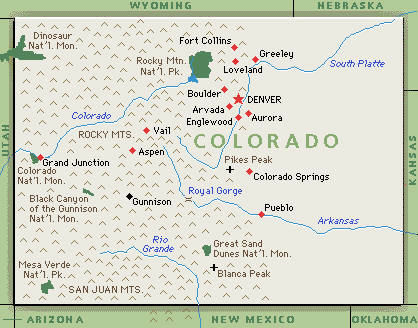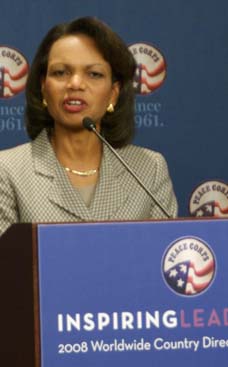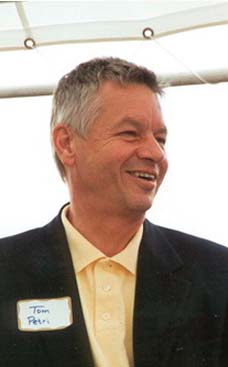
The Fort Collins arts and cultural initiative, which is funded by the Downtown Development Authority, was contacted by local returned Peace Corps volunteers who are organizing a museum dedicated to the organization. Inspired by the Peace Corps’ local ties, they began brainstorming ideas for a conference/reunion/party, said Beet Street Executive Director Carol Bennis. While plans are still in the works, the three-day event will include tributes to Albertson and others, a performance of the “Symphony for 1,000 Drums” conducted by the song's composer Halim El Dabh, panel discussions and lectures, and a juried photography exhibit of pictures taken by Peace Corps volunteers. While the purpose of the event is to create a gathering place for those who served as volunteers—and to honor their work—it's also a reminder that Fort Collins, CSU and residents played a part in crafting the organization. “The notion of fielding the reunion would draw attention to Fort Collins’ unique connection to the Peace Corps,” she said. “And then we thought about the Democratic National Convention being in Denver. It really gave us a platform to brainstorm.”
Peace Corps & Friends-A Celebration is one of this summer's Beet Street projects in Fort Collins Colorado
Peace be With Us
Inspired by Fort Collins’ connection to the Peace Corps, Beet Street throws a party
By Andra Coberly, (Bio) acoberly@fortcollinsnow.com
4:17 p.m. MT May 23, 2008
Maury Albertson talks casually and reflectively about his past—like how most people might converse about their life's work.
But Albertson is not most people. He happens to be much more accomplished, worldly-wise and passionate than most people. His footprint has made a much deeper, more distinct track than most.
Albertson, a former Colorado State University professor, retired director of CSU's Research Foundation and a Fort Collins resident, was co-founder of the Peace Corps, and his work is considered the groundwork for the program, which has sent about 190,000 volunteers into the Third World since John F. Kennedy's executive order establishing it on March 1, 1961. The global service organization was crafted to change the image of the “ugly American” outside of the United State and to encourage Americans to see other parts of the world.
In 1960, Fort Collins became the womb for what would later be called the U.S. Peace Corps when Albertson and the CSU Research Foundation received a federal grant of $10,000 to study "the advisability and practicality" of an international volunteer organization comprised of young Americans. Now, almost 50 years after Albertson and others began that initial work, 500 to 1,000 Peace Corps volunteers are preparing to meet in Fort Collins in August to celebrate the program.
Peace Corps & Friends-A Celebration is one of this summer's Beet Street projects. The Fort Collins arts and cultural initiative, which is funded by the Downtown Development Authority, was contacted by local returned Peace Corps volunteers who are organizing a museum dedicated to the organization. Inspired by the Peace Corps’ local ties, they began brainstorming ideas for a conference/reunion/party, said Beet Street Executive Director Carol Bennis.
While plans are still in the works, the three-day event will include tributes to Albertson and others, a performance of the “Symphony for 1,000 Drums” conducted by the song's composer Halim El Dabh, panel discussions and lectures, and a juried photography exhibit of pictures taken by Peace Corps volunteers.
While the purpose of the event is to create a gathering place for those who served as volunteers—and to honor their work—it's also a reminder that Fort Collins, CSU and residents played a part in crafting the organization.
“The notion of fielding the reunion would draw attention to Fort Collins’ unique connection to the Peace Corps,” she said. “And then we thought about the Democratic National Convention being in Denver. It really gave us a platform to brainstorm.”
When Albertson began conducting the study in the early 1960s, he called on CSU faculty looking for anyone who had experience working in Third World countries. He collected about 20 people, who together had spent about 100 years in faraway areas of the world.
“It was an outstanding thing,” he said. “I had no idea. … Then I asked them what should be the activities of Peace Corps volunteers going to those countries. They all gave their opinions and I copied it down. And then I talked to some other people. Then I started traveling across the United States.”
It seems simple, but Albertson was in fact creating a framework for Peace Corps volunteer efforts, learning how volunteers would best be found and what their training would entail.
Beyond the study, Albertson also worked with Sargent Shriver, the first Peace Corps director and Kennedy's brother-in-law, to shape the program. Albertson calls him Sarge and remembers him fondly.
“One of the things that Sarge Shriver told Jack Kennedy was that he didn't want to have the CIA using the Peace Corps volunteers, and so he got Jack to issue an edict to the CIA that they would not talk to anyone who had anything to do with the Peace Corps,” he said. “I had developed a series of international programs and projects at CSU at the time and so I had faculty overseas. The CIA came around frequently to talk with them. Then, one day the president of the university called and said that there was a CIA agent coming and wanted to talk to me. I thought it might be a good chance to test out the edict. So, he went over and sat down and his first question was, ‘Do you have anything to do with the Peace Corps?’ And I said, ‘Yes I do.’ And he said, ‘Well, I can't talk with you.’ It was working. Though, some people are saying it’s different these days.”
Albertson says Kennedy wasn't always so pro-Peace Corps. In fact, the soon-to-be president did not mention the program until just weeks before the election, after other politicians, like Hubert Humphrey, had been promoting the idea for some time.
“Jack Kennedy was speaking at the University of Michigan and he decided to mention the Peace Corps. The students made so much noise that he couldn't finish the speech,” he said. “ We knew they had a good international program, so we knew the students would be very much interested. And then one week before the election, he was at the Cow Palace in California and he mentioned the Peace Corps and got another rousing response. He then knew that the Peace Corps was a good thing from the public’s point of view.”
Albertson and other locals at the time also played a role in training the first groups of Peace Corps volunteers, who went to Pakistan. He will get to see the members of “Pak 1” when they reunite for the celebration.
“They were outstanding people. And outstanding people still today,” he said.
While Albertson is generally casual about discussing his work, he does not underestimate the impact of the Peace Corps on its volunteers and on America. Though, he does have thoughts on how to better the program. He would like to see the organization train volunteers to teach villagers in Third World countries how to be self sufficient and sustainable, much like the work done with Village Earth, the organization Albertson now heads as its president.
“(The Peace Corps) has given almost 200,000 Americans an opportunity to see a part of the world that most Americans don't see and given them an understanding of that world,” he said. “It gives them a broader view of what is going on, and that much of the world's population is living in poverty. But they often aren't able to do much about it, most are teaching English or helping in some way … but for the most part they don't help people get out of poverty. But they certainly see people in poverty and understand that.”









